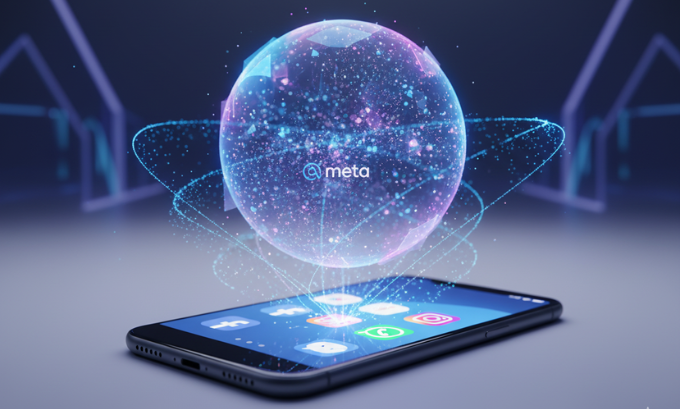Have you noticed a new search bar popping up in Facebook, Instagram, or WhatsApp asking you to “Ask Meta AI”? You’re not imagining things. Meta AI is Meta’s powerful new assistant, and it’s already integrated into the apps you use daily. Think of it as your on-demand creative partner, research tool, and productivity booster—all without leaving your chat.
Powered by Llama 3, Meta’s cutting-edge large language model, this generative AI is fundamentally changing how we interact with social media. Whether you’re planning a weekend getaway in a WhatsApp group, brainstorming Instagram captions, or simply curious about the future of tech, this guide breaks down exactly what is Meta AI, how it works, and how you can put it to use. And if you’re inspired to dive deeper into AI’s potential, platforms like Simplilearn’s AI and Machine Learning courses can turn curiosity into career-ready skills.
Table of Contents
What Exactly is Meta AI?
Meta AI is an intelligent, conversational assistant developed by Meta Platforms that lives inside Facebook, Instagram, WhatsApp, and Messenger. Unlike basic chatbots, Meta AI is powered by Llama 3, one of the most advanced open-source large language models available today. This allows it to understand complex questions, generate creative text, create unique images, and handle tasks in a way that feels remarkably natural.
Here’s a practical example: instead of switching to your browser to find a recipe, you can ask Meta AI directly in your WhatsApp group chat to “suggest a vegan lasagna recipe,” and it responds instantly. Need a caption for your latest Instagram post? Just ask Meta AI to “write a witty caption for a photo of my cat sleeping,” and you’ll get several creative options. This seamless integration is what makes Meta AI a true game-changer for everyday digital life, much like the broader trends in AI for brand strategy are reshaping how businesses operate.
How I Planned a Weekend Trip Using Only Meta AI
As someone who’s always exploring new tech, I wanted to test Meta AI’s real-world utility. I decided to plan a weekend hiking trip with friends using only WhatsApp and Meta AI.

I created a group chat and invited Meta AI by typing “@Meta AI.” My first prompt: “We want to plan a 2-day trip to a hiking spot near San Francisco. Give us three options with different difficulty levels.”
Within seconds, Meta AI returned three suggestions: Mount Tamalpais for a challenge, Muir Woods for a moderate walk, and Lands End for an easy coastal trail. Each came with brief descriptions, trail lengths, and estimated driving times.
Next, I asked it to “find a dog-friendly restaurant with outdoor seating near Mount Tamalpais.” It provided a list of three restaurants, complete with links to menus and reviews. The conversation felt organic, almost like chatting with a well-informed friend.
The final test: generating an image to get everyone excited. I prompted: “/imagine a group of friends laughing on a sunny mountaintop with a golden retriever.” Within seconds, a high-quality, unique image appeared in the chat.
This single experience showed me Meta AI’s real-world power. It moved seamlessly from research assistant to local guide to creative tool—all without leaving a single app. While the technology is still evolving, its ability to streamline planning and spark creativity is undeniable. For more on how AI is transforming everyday tasks, explore this guide on consumer electronics show innovations.
What I Like: Meta AI’s Core Strengths
- Seamless Integration: It’s already in the apps you use daily, reducing the need to switch between different tools.
- Creative Power: The image generation feature is fast and produces high-quality, unique visuals for posts and messages.
- Real-Time Information: Its connection to Google and Bing means you get up-to-the-minute answers, not just information from its training data.
- Open-Source Foundation: Built on Llama 3, it benefits from the innovation and transparency of the open-source community, a key topic at events like the Consumer Electronics Show 2025.
Areas for Improvement: Current Limitations
- Still Learning: Like all AI, it can occasionally misunderstand context or provide inaccurate information. Fact-checking remains important.
- Privacy Concerns: Integrating AI so deeply into personal conversations raises valid questions about data privacy, a major theme in discussions around cybersecurity trends for 2025. Meta is working on this, but user caution is advised.
- Limited Availability: Meta AI is still rolling out globally, so not all users have access to all features yet.
Meta AI for Business: Supercharging Your Brand’s Presence
Meta AI isn’t just for personal use—it’s a powerful tool for businesses, marketers, and entrepreneurs. By leveraging its capabilities, you can enhance your marketing efforts, automate tasks, and engage with your audience in innovative ways. This aligns perfectly with broader trends in AI in social media marketing.

Content Creation Made Simple
Struggling with creative block? Meta AI serves as your on-demand brainstorming partner. Whether you’re on Facebook or Instagram, you can use it to generate fresh ideas for posts, stories, and campaigns.
How to use it:
- Caption Generation: Ask Meta AI to “write three engaging captions for a post about our new coffee blend.”
- Hashtag Strategy: Prompt it with “suggest 10 relevant hashtags for a post targeting eco-conscious millennials.”
- Blog Post Ideas: Need to populate your blog? Ask, “Give me five blog post ideas about the benefits of remote work.”
These features allow social media managers to focus more on strategy and less on the repetitive tasks of content creation, making it a valuable addition to any SEO toolkit.
Customer Service Automation
One of the most immediate applications for businesses is customer service automation. Meta AI can handle frequently asked questions, provide instant responses to customer inquiries, and guide users to the right information—all within Messenger and WhatsApp.
Real-world scenario:
A small e-commerce boutique can use Meta AI to answer questions like, “What are your store hours?” or “What is your return policy?” This frees up human agents to handle more complex issues, improving efficiency and customer satisfaction. It’s an example of technology working smarter, not harder—similar to how affordable accounting software helps startups manage finances more efficiently.
Market Research and Trend Analysis
Because Meta AI can access real-time information from the web, it can be a surprisingly effective tool for quick market research.
How to use it:
- Competitor Analysis: “What are the latest marketing campaigns from competing local cafes?”
- Trend Spotting: “What are the trending topics in sustainable fashion on Instagram right now?”
- Audience Insights: “Summarize the main challenges faced by first-time homebuyers in 2024.”
This allows businesses to stay agile and responsive to market changes, a crucial element for success in an evolving landscape.
| Business Function | How Meta AI Helps | Example Prompt |
|---|---|---|
| Marketing | Generates creative content and ideas. | “Create an Instagram story outline for a 24-hour flash sale.” |
| Customer Service | Automates responses to common questions. | “What is our shipping policy to Canada?” (Answered by AI) |
| Sales | Helps qualify leads by asking initial questions. | “What is your budget for a new laptop?” (Asked by AI in a chat) |
| Strategy | Provides quick summaries of market trends. | “Summarize the top 3 AI trends discussed at CES 2025.” |
The Technology Behind the Magic: Understanding Llama 3
Meta AI’s intelligence is powered by Llama 3, the latest generation of Meta’s open-source large language model. This is the “engine” that enables Meta AI to understand, reason, and generate human-like text and images. But what makes Llama 3 special?

Unlike closed-source models like OpenAI’s GPT-4, Llama 3 is open-source. This means its code and architecture are available to developers, researchers, and businesses worldwide. This approach fosters innovation, improves safety through community review, and accelerates the development of new AI applications. For those interested in learning these fundamentals, there are many excellent coding courses available.
Llama 3 was trained on a massive dataset of text and images, giving it a deep understanding of language, context, and visual concepts. It’s designed to be more “steerable,” meaning users have more control over the tone and style of its responses. This is a significant step forward in making generative AI a more reliable and customizable tool for both personal and professional use.
Meta’s Bigger Vision: Beyond a Simple Chatbot
It’s important to understand that Meta AI is not just another chatbot. It’s a core part of Meta Platforms’ long-term vision to build a more intelligent and interconnected digital world. This vision extends beyond simple text-based conversations.
The company is also integrating AI into its hardware, like Ray-Ban Meta smart glasses, allowing users to identify objects and get information about the world around them in real-time. This strategy puts Meta in direct competition with tech giants like Google (with Gemini) and Apple (with its upcoming AI features). Each company is racing to create the most helpful, integrated, and seamless AI assistant.
This competition is driving rapid innovation, pushing the boundaries of what AI can do. The landscape is constantly changing, with new developments announced regularly. Staying informed about these advancements is crucial for anyone in the tech space. For more on staying ahead, check out insights on best AI tools for 2025.
Upskilling for the AI Revolution
The rise of tools like Meta AI highlights a major shift in the job market. Proficiency in generative AI and machine learning is no longer a niche skill—it’s becoming essential for marketers, developers, business analysts, and more. Understanding what is Meta AI is just the first step.
This is where platforms like Simplilearn come in. As a leading online education provider, Simplilearn offers programs designed to equip you with the skills needed to thrive in the AI era. Their Post Graduate Program in AI and Machine Learning, in partnership with Purdue University, provides comprehensive training from foundational concepts to advanced applications.
Why consider upskilling?
- Industry-Relevant Curriculum: Courses are designed with industry experts to ensure you learn the most in-demand skills.
- Expert Instructors: Learn from seasoned professionals with real-world AI experience.
- Career Support: Gain access to career services that help you land a job at a top company.
Investing in your AI education is investing in your future. As AI continues to transform industries, those with the expertise to build, manage, and leverage these tools will be in high demand.
Frequently Asked Questions
What is Meta AI and how is it used in WhatsApp?
Meta AI is an AI assistant integrated into WhatsApp. You can chat with it directly or mention it in group chats by typing @Meta AI to ask questions, generate images, or get recommendations without leaving the conversation.
What is a meta tag in SEO?
A meta tag is a snippet of text in a webpage’s HTML code that describes its content to search engines. The most common meta tags are the title tag and meta description, which influence how a page appears in search results. This is different from Meta AI.
What is meta communication?
Meta communication is “communication about communication.” It refers to unspoken cues like tone of voice or body language that provide context for words. This concept is separate from Meta’s AI technology.
What is metadata in a DBMS?
In a Database Management System, metadata is “data about data.” It provides information about the database structure, such as table names, column data types, and constraints.
How is Meta AI different from ChatGPT?
The main difference is integration. Meta AI is built directly into Facebook, Instagram, and WhatsApp, making it accessible within your existing social apps. It also has unique features like real-time image generation during a chat.
Is my data safe when using Meta AI?
Meta states that personal chats with Meta AI are not shared publicly and are used to train the model in ways that protect user privacy. However, users should always be cautious about sharing sensitive information with any AI assistant. Ongoing developments in cybersecurity are crucial to monitor.
Can I turn off Meta AI?
You cannot completely remove Meta AI from the apps, but you can choose not to interact with it. You can mute notifications from the Meta AI chat or simply ignore the “Ask Meta AI” search bar.
Your Next Step Into the AI-Powered Future
Meta AI represents a significant leap forward in making artificial intelligence accessible and useful for everyone. It transforms the social media platforms we use every day into more interactive, creative, and productive environments. From planning a trip on WhatsApp to brainstorming marketing ideas on Instagram, its potential is vast.
As this technology continues to evolve, understanding its capabilities and limitations is essential. The best way to learn is by doing. Try asking Meta AI a question in your favorite app today and see how it responds. And if you’re inspired to go deeper and turn this fascination into a profession, explore the AI and Machine Learning courses offered by Simplilearn.
The AI revolution is here, and now is the time to become a part of it. Whether you’re looking to enhance your personal productivity or transform your business strategy, Meta AI offers a glimpse into the future of digital interaction—one conversation at a time.


